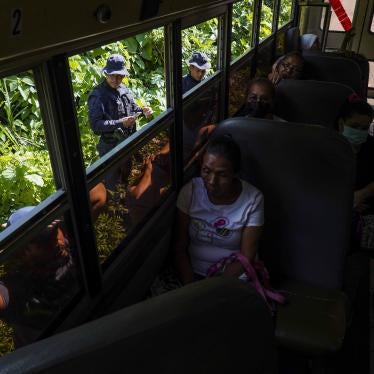(Washington D.C.) - The recent sentencing of four Mapuche Indians and a supporter on terrorism charges is a grossly exaggerated response to unrest in southern Chile, Human Rights Watch and the Indigenous Rights Program at the University of the Frontier’s Institute of Indigenous Studies said today.
“By using the harshest possible legal regime against the Mapuches, the Chilean government is unfairly lumping them together with those responsible for the worst crimes, like mass murder,” said José Miguel Vivanco, executive director of the Americas Division of Human Rights Watch. “It is deeply unfortunate that the authorities have made prosecutions for terrorism the main plank of their strategy for containing violence in the South.”
In a statement yesterday, the undersecretary of the interior, Jorge Correa, called the verdict “a triumph the government would prefer not to have.” He said that the trials had contributed to pacifying Chile’s southern provinces, troubled for years by land conflicts between Mapuche communities and forestry companies and private landowners. He also affirmed that the dismantling of the leadership of the Mapuche protests was the consequence of a “successful and systematic intelligence effort called Operation Patience.”
“The undersecretary’s statements reveal the efforts made by the government and the police in recent years to break up the Mapuche movement that has been protesting against the appropriation of their land and natural resources by companies investing in the south of Chile,” said José Aylwin, Coordinator of the Indigenous Rights Program at the University of the Frontier.
The five were sentenced on Sunday night to ten years in prison for “terrorist arson,” after they were found responsible for setting fire to a pine plantation on the Poluco Pidenco estate near Ercilla, land that belongs to the logging company Mininco. All of the defendants are said to be members of the Arauco Malleco Coordinating Group (CAM), a Mapuche group that has advocated direct action to recover disputed lands.
Since 2002 the attorney general’s office has prosecuted members of the group under a counter-terrorism statute introduced by former dictator Augusto Pinochet to deal with opposition to his rule. The law was amended in 1991 by the elected government of President Patricio Aylwin.
Terrorist acts under the law include the burning of fields, woods, and buildings, when intended to produce fear in the population or a part of it. In a case that is expected to reach the courts in October, 18 alleged members of the CAM are accused of the crime of forming an “illegal terrorist association.”
The minimum sentence for terrorist arson is ten years in prison, which is double the ordinary criminal code’s penalty for arson. Under Chile’s Constitution, those convicted of terrorism are barred for fifteen years from public office; from occupying teaching posts; exercising trade union or business responsibilities; or practicing journalism. They are not eligible for a presidential pardon.
The law allows prosecutors to withhold evidence from the defense for up to six months, and to conceal the identity of witnesses, who may give evidence in court behind screens. More than 40 “faceless” witnesses are expected to testify for the prosecution in the “terrorist association” case. Human Rights Watch is concerned that these provisions of the law limit the ability of defendants to rebut the charges against them.
So far, no one has been killed as a result of violence attributed to the CAM. The only victim of the land conflict is a 17-year-old Mapuche and CAM sympathizer, Alex Lemun, who was shot by a police officer during a land protest in November 2002. In contrast to the prosecution of the Mapuches, the officer responsible for the shooting has not faced criminal charges by the military tribunal investigating the case.
The Chilean Supreme Court has put its weight behind these counter-terrorist prosecutions, overriding decisions of lower courts that have favored the accused. In July 2003, it annulled a court ruling that had acquitted three Mapuches of terrorist arson. Two of the defendants were sentenced in a second trial to five years of imprisonment for “terrorist threat.” In the Poluco Pidenco case, Judge Nancy Germany held that application of the counter-terrorism law was inappropriate. A Supreme Court panel ordered the terrorism charge reinstated and removed her from the case.
“Chile’s legislators must revise the country’s counter-terrorism legislation to ensure that it is not abused like this again, and to establish due process guarantees so that the rights of defendants are fully respected,” Vivanco said.
Aylwin and Vivanco called on President Ricardo Lagos to implement the recommendations of the United Nations Special Rapporteur on the situation of human rights and fundamental freedoms of indigenous people. In a recent report, the Rapporteur expressed concern at the criminalization of Mapuche demands and urged the government to search for a negotiated solution to the problems in the south based on respect for their rights.






